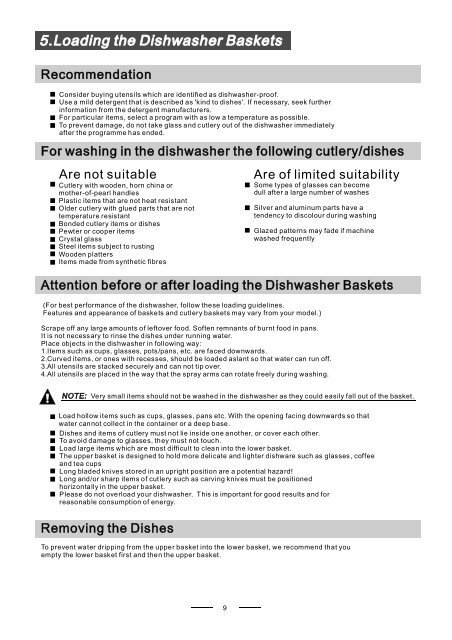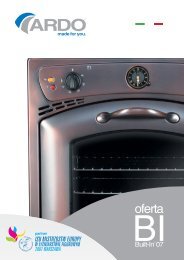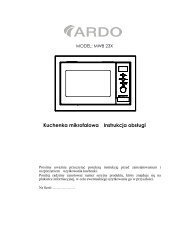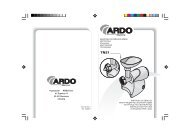DWI ) 10L6 ( GB - Ardo
DWI ) 10L6 ( GB - Ardo
DWI ) 10L6 ( GB - Ardo
Create successful ePaper yourself
Turn your PDF publications into a flip-book with our unique Google optimized e-Paper software.
Consider buying utensils which are identified as dishwasher-proof.<br />
Use a mild detergent that is described as 'kind to dishes'. If necessary, seek further<br />
information from the detergent manufacturers.<br />
For particular items, select a program with as low a temperature as possible.<br />
To prevent damage, do not take glass and cutlery out of the dishwasher immediately<br />
after the programme has ended.<br />
Are not suitable<br />
Cutlery with wooden, horn china or<br />
mother-of-pearl handles<br />
Plastic items that are not heat resistant<br />
Older cutlery with glued parts that are not<br />
temperature resistant<br />
Bonded cutlery items or dishes<br />
Pewter or cooper items<br />
Crystal glass<br />
Steel items subject to rusting<br />
Wooden platters<br />
Items made from synthetic fibres<br />
Are of limited suitability<br />
Some types of glasses can become<br />
dull after a large number of washes<br />
Silver and aluminum parts have a<br />
tendency to discolour during washing<br />
Glazed patterns may fade if machine<br />
washed frequently<br />
(For best performance of the dishwasher, follow these loading guidelines.<br />
Features and appearance of baskets and cutlery baskets may vary from your model.)<br />
Scrape off any large amounts of leftover food. Soften remnants of burnt food in pans.<br />
It is not necessary to rinse the dishes under running water.<br />
Place objects in the dishwasher in following way:<br />
1.Items such as cups, glasses, pots/pans, etc. are faced downwards.<br />
2.Curved items, or ones with recesses, should be loaded aslant so that water can run off.<br />
3.All utensils are stacked securely and can not tip over.<br />
4.All utensils are placed in the way that the spray arms can rotate freely during washing.<br />
Very small items should not be washed in the dishwasher as they could easily fall out of the basket.<br />
Load hollow items such as cups, glasses, pans etc. With the opening facing downwards so that<br />
water cannot collect in the container or a deep base.<br />
Dishes and items of cutlery must not lie inside one another, or cover each other.<br />
To avoid damage to glasses, they must not touch.<br />
Load large items which are most difficult to clean into the lower basket.<br />
The upper basket is designed to hold more delicate and lighter dishware such as glasses, coffee<br />
and tea cups<br />
Long bladed knives stored in an upright position are a potential hazard!<br />
Long and/or sharp items of cutlery such as carving knives must be positioned<br />
horizontally in the upper basket.<br />
Please do not overload your dishwasher. This is important for good results and for<br />
reasonable consumption of energy.<br />
To prevent water dripping from the upper basket into the lower basket, we recommend that you<br />
empty the lower basket first and then the upper basket.<br />
9















